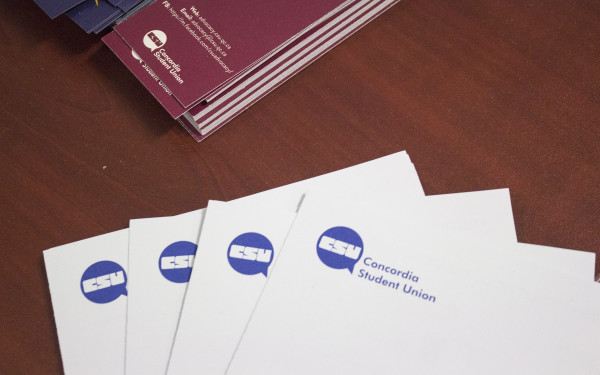CSU Election Debate Focuses on Referendum
Council Candidate Debate Overshadowed by Referendum Question
The CSU held its only debate for the upcoming by-election on Friday evening in front of their office in the Hall building.
The debate gave a platform to supporters and opponents of the referendum questions to make their case to students. Student’s running for CSU council were also given the chance to convince students to vote for them.
First on the agenda was the referendum question on the fee levy increase for the Department of Recreation and Athletics.
“We haven’t had an increase in over ten years,” said Kathleen DiCaprio, a marketing manager for Department of Recreation and Athletics, on why they want to increase their fee levy.
She said the increased funding would reduce student gym membership costs, make
Stingers games free for students, and bring more sports clubs under the Stingers banner.
“We know that not everybody likes going to the gym,” answered DiCaprio to a student concerned about how this would benefit students not interested in athletics. She said the funds would also go towards informal recreation like ping pong tables or chess.
“I hate these debates and I hope this is the last one I ever do” said Christopher Kalafatidis, the General Coordinator of the CSU, as he took the stage to argue for an online opt-out system, a key campaign promise from his slate Cut The Crap.
He said argued online opt-out would mean better accessibility for students. He also said it would be developed in conjunction with fee levy groups before it was brought to the university administration.
“On the surface this seems harmless, but it’s a serious decision that will have dangerous consequences,” said Emily Carson-Apstein, the external coordinator for Sustainable Concordia, against an online opt-out system.
They cited approximately 10 per cent decrease in funding McGill clubs saw when they instituted a system in 2007. They also worry students would blanket opt out of fees without knowing what these groups do.
Carson-Apstein also pointed out that implementing such a system might not even be possible.
They cited a university policy that says the Student Account Services department must be consulted before any change is made to the fee system. According to Carson-Apstein, the department said they would not implement such a system in the student online portal.
Kalafatidis returned to stage to defend the second referendum question brought forth from a Cut The Crap campaign promise.
The Council Change question, also known as “Faculty Equality,” would change the faculty seat allocation from a dynamic proportional system to a fixed system, and reduce the size from 30 to 16 seats.
Currently, seats are allocated based on the size of the student body and change year to year. The proposed change would split Arts and Science in two and give each faculty three seats, with no consideration for change in sizes.
During his opening statement, Kalafatidis claimed the Arts and Science faculty having a majority of seats. But, the latest seat allocation as voted on by the CSU gave Arts and Science 13 seats out of 30.
He implied faculties function like political parties with members voting as a group. However, the current model only determines a maximum of councillors from a specific faculty—the only uniting factor for these councillors.
Kalafitidis also argued less councillors would make the CSU more efficient.
“There would be less seats, less representation, it would be not proportional,” said Esther Morand, an Arts and Science councillor, arguing against this change.
She pointed out that Arts and Science has the most seats because it has the most students, and changing that allocation would not bring equality.
Council Candidacies
Once it was time for the council candidates to debate, few students remained in the audience. Only eight of the 15 candidates listed on the CSU Elections website were present.
The first round featured Mathieu Kazan-Xanthopoulos, a Political Science student, Selena Mezher, a Civil Engineering student, and Peter Zhuang, a music student.
At the time of the debate, Kazan-Xanthopoulos was not listed on the CSU Elections website as his candidacy signatures were under review.
Selena Mezher was elected as Sustainability Coordinator under the Cut The Crap slate in the last CSU general election, but resigned after failing to appear to council meetings.
Peter Zhuang is running for re-election, having served on council for the past two years.
Councillors were given time to outline their positions in an opening statement.
Kazan-Xanthopoulos voiced his disagreement with the CSU positions book, although he later seemingly retracted this view after a discussion with an audience member.
Mezher said the faculty of engineering is underrepresented at the CSU. She expressed her desire to allocate more money to engineering related projects. She cited the $15 million dollar donation from Gina Cody despite the fact that the CSU has no say on how that money is spent.
Zhuang expressed desire to get more Fine Arts students involved with the CSU.
The second round was composed of John Molson School of Business students Lauren Perozek, Marketing Co-op, Samuel Century, Finance, Mathew Kaminski, Accounting, Mitchell Schecter, Accounting, and Vandolder-Beaudin, Finance.
Danielle Vandolder-Beaudin was elected as Finance Coordinator for the CSU with the Cut The Crap slate before being disqualified for illegal campaigning. The Chief Electoral Officer banned her from running in any CSU election for a year, but that decision was overturned by the Judicial Board.
The main policy question they had to face was whether or not they support online opt-out. All said yes but Samuel Century, who worried about the negative effect it would have on fee levy groups.

_900_600_90.jpg)


_900_642_90_600_375_90_s_c1.jpg)

_600_375_90_s_c1.jpg)
_600_375_90_s_c1.jpg)